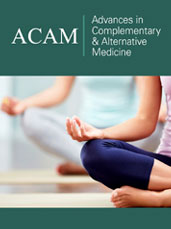- Submissions

Full Text
Advances in Complementary &Alternative Medicine
Alternative Medicine: Stress Management and Opioids Use
Alham Abuatiq*
South Dakota State University, USA
*Corresponding author: Alham Abuatiq, PhD, RN, Assistant Professor, College of Nursing, South Dakota State University, Brookings, USA
Submission: May 09, 2018;Published: May 21, 2018

ISSN: 2637-7802Volume2 Issue5
Introduction
The purpose of this paper is to provide literature review of studies that focused on stress and opioids use. The subjective nature of stress makes any given individual respond to any potential stressor in a unique individualized manner, based on the psychological, physical, and previous life experiences that build up the ability of the individual to adapt to stressors. Stress is defined as a “Perceptual phenomena arising from a comparison between the demand on the person and his ability to cope, an imbalance in this mechanism gives rise to the experience of stress” [1]. Stress can increase vulnerability to addiction. Research studies have defined the important role of endogenous opioids in modulating stressassociated behavior. Administration of mu opioid agonists reduces the risk of developing post-traumatic stress disorder (PTSD) following a traumatic event by inhibiting fear-related memory consolidation, on the other hand, stress induces opioid craving and reinstates drug of abuse [2].
Healthcare providers should be alerted to the underlying mechanisms for the association between opioids abuse and stress. Many clients with chief complain of acute or chronic pain end with an opioid prescription, and start-using opioids to control pain, overtime individuals show enhanced sensitivity to craving and greater anxiety in stress- and drug-related situations [3]. According to Centers of Disease Control (CDC)each day 46 people die from an overdose of prescription painkillers in the US, and in 2012 more than 259 million prescriptions were written for opioids, which is enough to give every American adult their own bottle of pills [4]. Unfortunately, many prescribers use opioids as the first line treatment of pain as a pharmacological intervention. There is need to utilize non-pharmacological pain management, and stress reduction techniques before considering prescribing an opioid for pain management. Developing a national pain management protocol that prompt health care providers to use alternative medicine as first line treatment for pain is highly recommended to decrease use and abuse of opioids.
Alternative medicine methodologies focused on managing pain, and decreasing client’s stress are crucial to consider before prescribing opioids to manage pain. Health care providers play major role in client teaching, and education related to the consequences of using opioids and considering alternative medicine. Non-pharmacological pain and stress management techniques may include, but not limited to the following: Enrolling the client in-group support focused on meditation and focused breathing techniques. This technique has the potential to provide cognitive, social behavioral distraction for the client to re-focus and control both pain and stress.
The second method may include use of distractive imagery; this includes providing distractive images for the client to distract him/ her from feeling pain or stress. The use of video entertainment may also help in providing distractive imagery. Moreover, using virtual realities for example Xbox gaming may be effective in pain and stress management according to the client’s preferences. The third method may include using aromatherapy and use of essential oils massage on the affected painful area. Other alternative methods of pain and stress management may include acupuncture, cubing, and electrotherapy all have the potential to decrease pain, and stress.
Healthcare providers need to holistically assess client’s pain, stress and personal interests to achieve a successful alternative medicine treatment. The response to non-pharmacological interventions may differ from one individual to another. In conclusion, alternative medicine plays a major role in reducing opioids use, and eventually its abuse. Managing patients stress and pain may reduce their urge to take opioids, and prevent the physiological, psychological and mental dependence of such drugs.
References
- Cochran J, Ganong L (1989) A comparison of nurses’ and patients’ perceptions of intensive care unit stressors. J Adv Nurs 14(12): 1038- 1043.
- Bali A, Randhawa PK, Jaggi AS (2015) Stress and opioids: Role of opioids in modulating stress-related behavior and effect of stress on morphine conditioned place preference. Neurosci Biobehav Rev 51: 138-150.
- Sinha R (2008) Chronic stress, drug use, and vulnerability to addiction. Annals of the New York Academy of Sciences 1141: 105-130.
- Centers for Disease Control and Prevention (2014) Opioid painkiller prescribing: Where you live makes a difference. GA: Centers for Disease Control and Prevention, Atlanta, Georgia.
© 2018 Alham Abuatiq. This is an open access article distributed under the terms of the Creative Commons Attribution License , which permits unrestricted use, distribution, and build upon your work non-commercially.
 a Creative Commons Attribution 4.0 International License. Based on a work at www.crimsonpublishers.com.
Best viewed in
a Creative Commons Attribution 4.0 International License. Based on a work at www.crimsonpublishers.com.
Best viewed in 







.jpg)






























 Editorial Board Registrations
Editorial Board Registrations Submit your Article
Submit your Article Refer a Friend
Refer a Friend Advertise With Us
Advertise With Us
.jpg)






.jpg)














.bmp)
.jpg)
.png)
.jpg)










.jpg)






.png)

.png)



.png)






